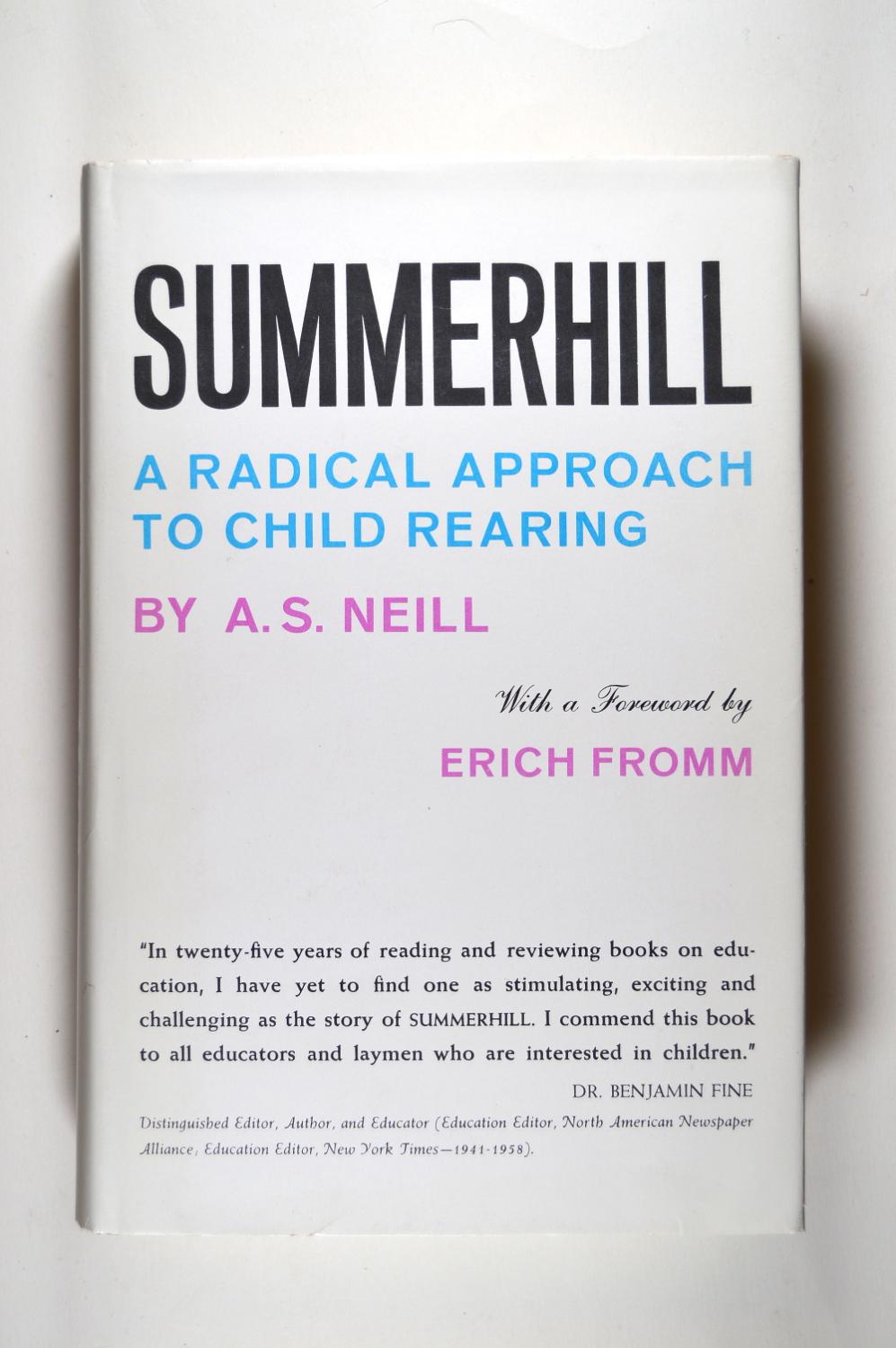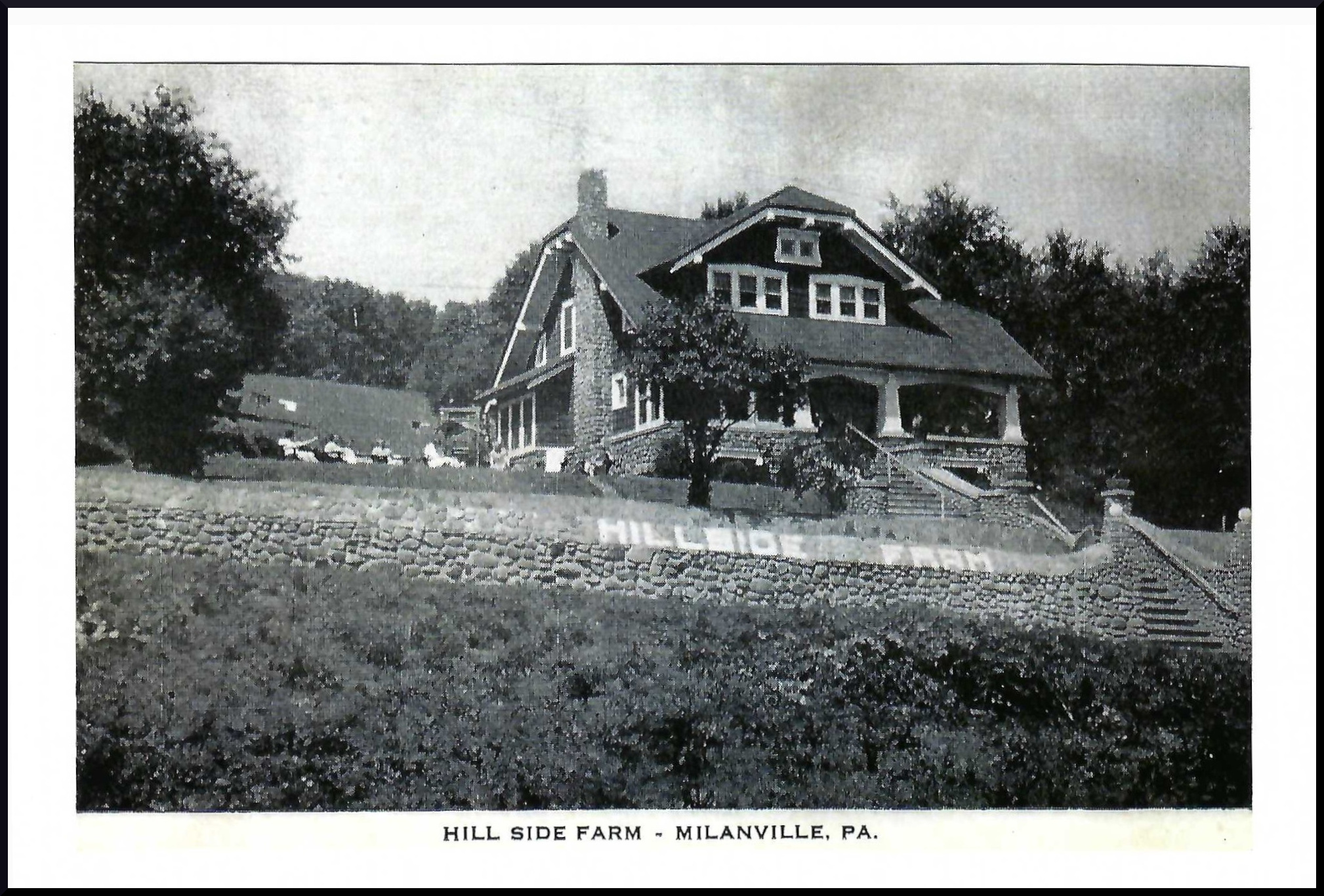Innisfree, 1970-1998
By Tom Rue
Chapter 5 - Separations in space and time
After two summers of operation, due largely to financial pressures and a difficulty recruiting campers, the original program folded. Another factor was that Innisfree's original founders (the Rues, the Maylones, Browns, and others) turned their energies to things other than trying to create a utopian society. Sarita Cordell and her son Rusty, Bill and Gail Brown, Lenore Migdall, Frank Ress, Tom Rue, and others lived at Innisfree in an effort to continue as an intentional community. The new name, used in advertising in the New School Exchange, was the "Innisfree Learning Environment." It was not a school, nor an educational program. As I recall it, it was essentially a group of people sharing the main house.
During this period, there were occasional long-term tenants in the recreation hall. One or more musical bands rented the big room for musical rehearsal and performances, and an upstairs apartment where band members live. I do not know much about this band, but have been told it went by the name "Fire". There may have been more than one band. If anyone wishes to send more information about uses to which the Innisfree property was put during the late 1970s, I would welcome it.
In the fall of 1972, the Rue family moved back to New Jersey, where Bud had a new job teaching in Princeton Middle School. It is not known to me how household living expenses were shared, but I know that each adult contributed various amounts to an account that was held by Frank Ress as the newly designated Treasurer of Innisfree Corporation. I know that my parents contributed financially to the corporation on my behalf during my time there. I do not know how much. Despite not attending school during this period of time, preferring to hang out in the main house or with friends who lived above the general store or elsewhere in Milanville. I still managed not to be held back academically (or be placed in a residential facility), and subsequently completed multiple years of college and graduate school. Witness, that youthful truancy need not be fatal, but at this stage of my life I do not recommend it.
Bud would also have preferred to remain in Milanville and not return to New Jersey in September 1972, but he was licensed to teach only in New Jersey public schools and he could not afford to the pay cut involved with teaching at a private school. To be licensed in the Keystone State would have required additional graduate classes (including one in the history of Pennsylvania, and some others), he was advised by state officials. He concluded that traveling for those additional post-graduate education was not practical for him by long-distance. (In modern times, three graduate classes completed remotely would not be such a challenged. But perhaps more of a factor for him may have been the impracticality of splitting a public school teacher's retirement plan between two different states' public employment retirement systems. A decade later, in 1989, Bud took the earliest pension for which he was eligible and finally moved back to Innisfree with Ann. I felt was fortunate to have the opportunity to move back full-time to the same property before my parents did, in September 1985, after I completed graduate school. Space for which I paid rent to Innisfree Corporation consisted of a self-sufficient apartment above the recreation hall. I also continued to spend a fair number of hours typing letters, press releases, and filing applications for government licenses and other corporate business.
Innisfree Learning Environment
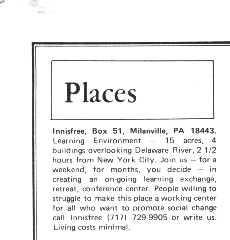
For a brief time Innisfree operated as something of a commune (I don't recall if it was termed that or not), or a year-round intentional community and living arrangement. Most residents were adults, but the few kids who lived there year-round either attended school in Damascus, or were truant with no formally approved home-schooling in place. As a young teen, I did both.
The April 31, 1972 issue of the weekly New Schools Exchange Newsletter, published in Santa Barbara, Calif., listed the announcement appearing above and to the right on their page 10.
There was talk an Innisfree board of trustees meeting of a residential school "for pre-delinquent boys". Some steps were taken in that direction. Although an Application for a License to Conduct a Private Academic School or Class was completed, the idea never got off the ground.
During these years, Milanville residents Andrea Henley and Michael Gutterman rented the former chicken coop to house the factory of the their enterprise, known as Hawkeye Candle Co. As I recall, they consigned candles locally and job-lotted them by the gross to outlets in the city. The company later outgrew the chicken coop and rented space in the old Milanville creamery.
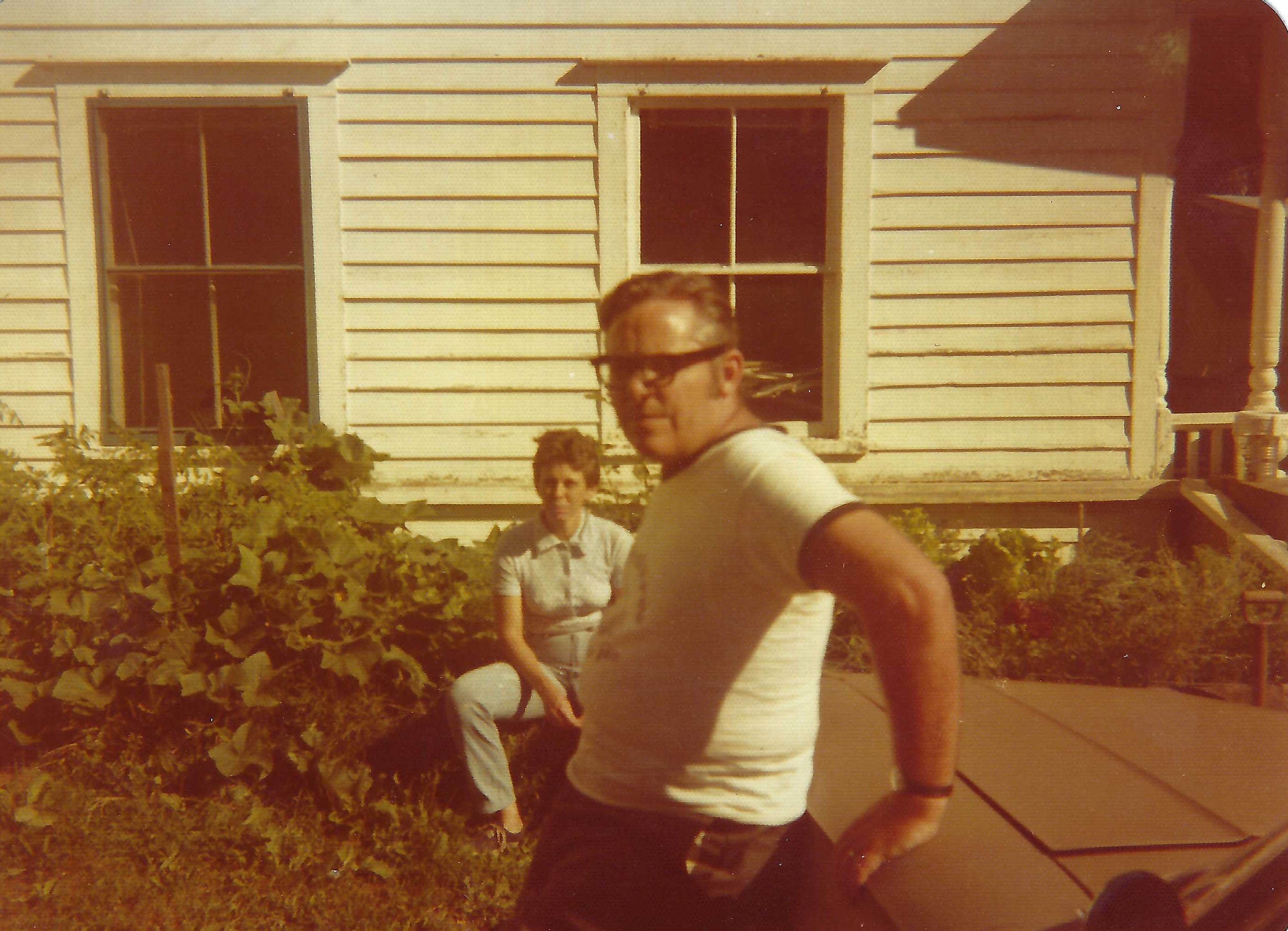
In July 1973, Innisfree's board of trustees discussed offering the facility to the Wayne County Commissioners, and Bud Rue contacted the governor's office seeking "seed money" for a proposal to dedicate the Innisfree property for use as an adolescent group home. State funds were reportedly "dry" that year for the development of new child-welfare group homes, according to an official in Harrisburg who spoke to Bud Rue about the idea of a county group home for delinquent and dependent youth (which did not then exist) being housed at Milanville. Board members present who took part in that 1973 discussion of a group home included: Bud (president) and Ann Rue (vice-president), Tom Rue (secretary), Rob and Margie Copeland, Jerry Boyer, Frank Ress (treasurer), Rosana Raspa, and Howard Fink. Rather than choosing the Innisfree proposal, the Wayne County Board of Commissioners opted to renovate the old poor farm in Beach Lake for the purpose (most likely a wise choice). Several years later, when I moved to Innisfree in 1985 having completed graduate school in counseling at Rider University, I accepted a job as a houseparent at the Wayne County Group Home in Beach Lake and worked in that capacity for a year.
From 1976 to 1980, at college and in the US Air Force in some western states and therefore not an eye witness to events at Innisfree during those years, when I came back east in October 1981, Frank Ress had recently filed a lawsuit against Innisfree Corporation and Bud and Ann Rue, seeking reimbursement for alleged amounts, with a goal of taking title to the Milanville property. For varying reasons, most of the people who had lived at Innisfree since 1970 had drifted on to other chapters of their lives. Ress, a New York accountant who came to Milanville in late 1971 to recover from a motorcycle accident, had stayed on. As others moved away, soon only Frank remained. His developed a possessive attitude toward the Innisfree property, even though he did not own it. With the Rues tied to jobs in New Jersey, in 1981 he imagined that he could "get clear title" to the property and either live out his days there or sell it. Neither happened.
An action in Equity
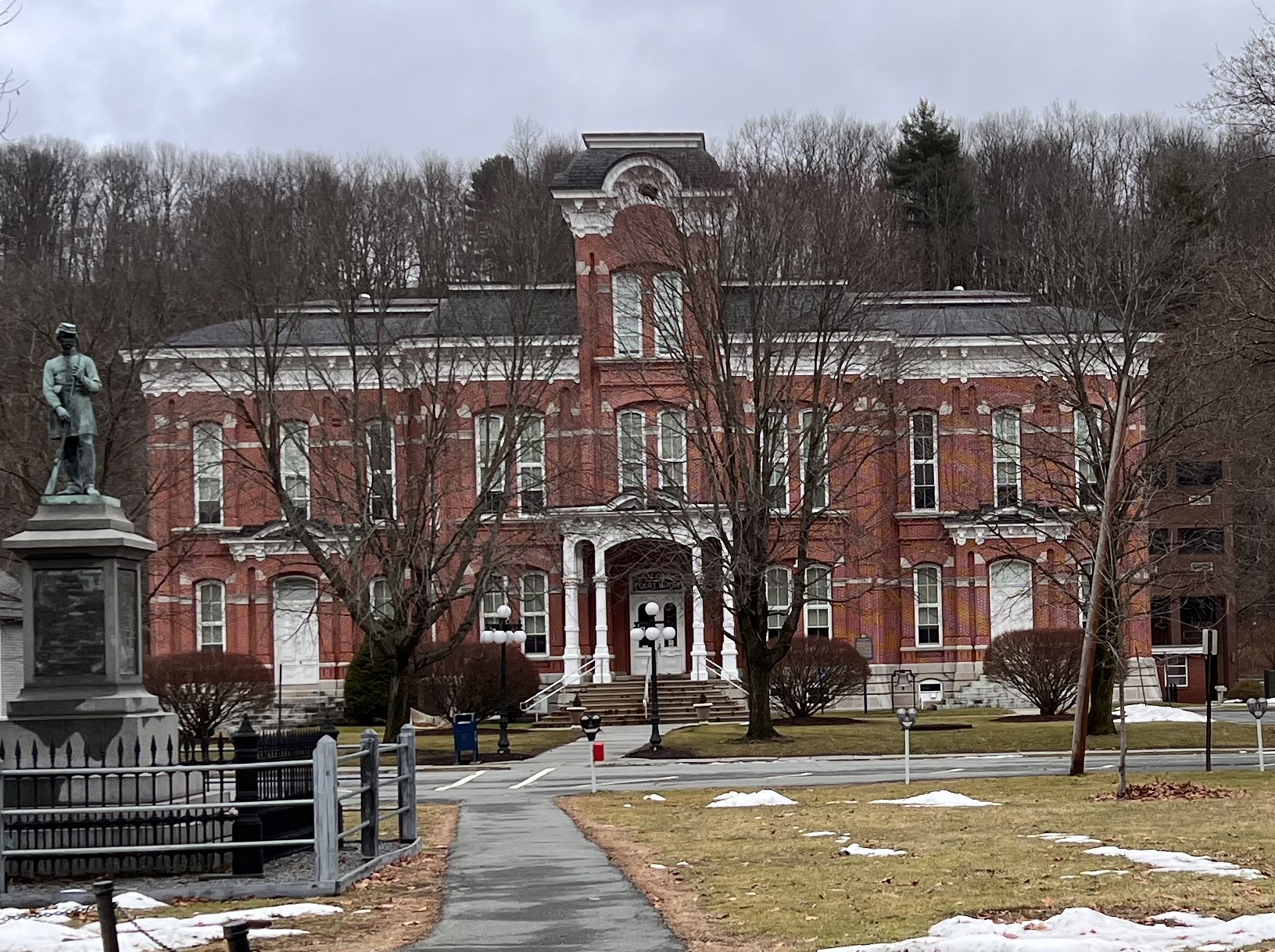
In September 1981, through a Lords Valley attorney named John A. Wittmaack (who was later disbarred and imprisoned for dishonesty), Frank filed a lawsuit against Innisfree Corporation and my parents personally, alleging breach of an alleged oral contract to pay him retroactively for caretaking, custodial, and bookkeeping services dating back to September 1, 1971. In his suit, Frank alleged that "a reasonable fee" would be $52,400. There was no indication how he arrived at this fantastic number. The legal action that he took against the not-for-profit corporation and two of its founding members, made fictitious claims about promises or and implied oral contracts. His attorney spun his what universally described by every lawyer I spoke with about it as a weak case, based on an obscure legal theory called Quantum Meruit. Because there was insufficient proof to hold a trial a Court of Law, we were told, the lawsuit was filed on the "Equity side" of the Wayne County Court of Common Pleas (No. 14, Civil Term of 1981). Frank's summons and complaint asserted a "breach of [oral] contract to repay monies lent," for an additional alleged $43,826.50 in mortgage payments, and for reimbursement of bills, including for his personal cable tv and utilities from the date that he moved in ten years earlier.
Frank's ethically challenged lawyer sought an "equitable lien" against Innisfree Corporation's property. The motion for a lien was denied. Frank's complaint asserted, "In the alternative, Plaintiff claims that from 1971 until date, the Plaintiff paid on behalf of the Defendant corporation or lent the Defendant corporation the sum of... $36,535... which sums were sued by the Defendant corporation to pay a Mortgage... if not repaid to Plaintiff will create an unjust enrichment on the part of the Defendant corporation and the Defendants, Clyde B. Rue and Ann Rue, his wife."

The proceedings drug on for over a year. My contribution to the defense was to compile and organize every document that I could locate through correspondence, phone calls, and personal visits pertaining to Innisfree between the years 1970 to 1982, including not just writing to obtain copies of all government filings that I could think of ever filed by Innisfree, as well as commercial account records of transactions with local businesses and people whose business records were important to the operation of Innisfree Corporation. This activity assisted the Innisfree's two attorneys on the matter, since, as former treasurer, Frank had possession of the books and business records of the corporation. My unpaid efforts, which amounted to a voluntary part-time job for two years while I was a full-time college student and working part-time at the New Jersey State Archives in Trenton, were described in a later college recommendation dated December 6, 1982, by Innisfree's New Jersey attorney, James F.X. Rudy Esq. of Trenton:

Some (those who could be located) who remembered first-hand the intentions and living arrangements in 1970 and 1971 responded to my outreaches. Gail Wilson Brown (a reporter and photographer for The Montclair Times, and married at the time to Bill Brown) and others, gave me photos and some negatives from early summers at Innisfree, as well as other historical information. For instance, Lenore Migdal physically handed me the following affidavit during a visit I made to her Manhattan apartment for the purpose of securing her testimony.
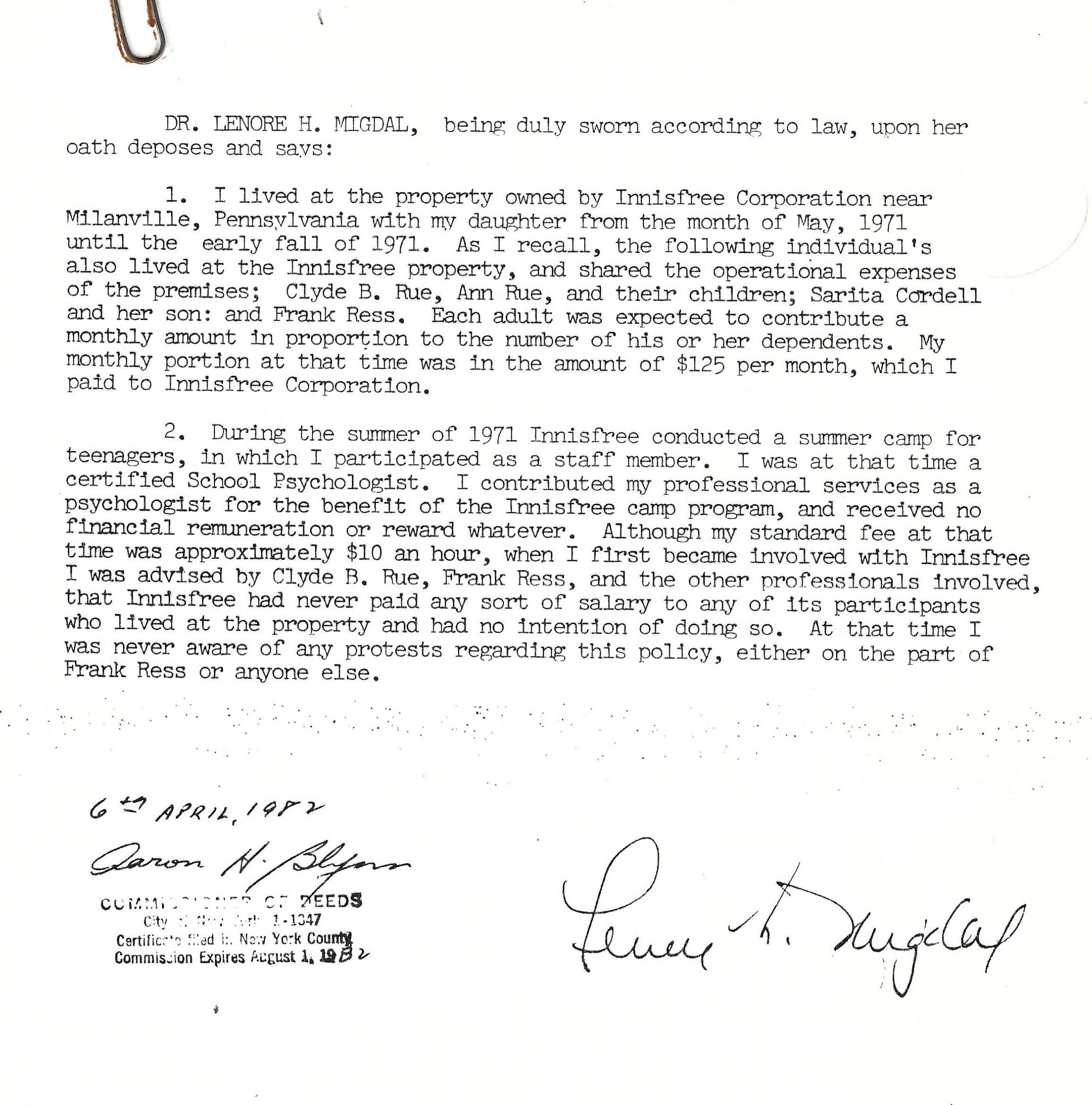
These historical details might have been adduced in more detail had there been a trial, but there was not. A occurred after I sent a blind request to Wayne County Bank & Trust Co. for any and all records that they had on file pertaining to Innisfree Corporation. Included with their response was a copy of a bank loan application completed by Frank and his girlfriend (and later wife) in September 1980. Frank signed the loan application as Treasurer, and his girlfriend signed as Secretary, and did so falsely under the name of Innisfree Corporation. The application was accompanied by a false corporate resolution, dated June 16, 1980, certifying that Innisfree's board of directors had approved the loan. In reality, no such meeting of trustees was ever held, and the other principals did not support the taking of the loan.
In a "Reply to New Matter" filed in response to the bank's petition (No. 1402 of 1981), Wayne County Bank and Truste Co., Innisfree stated: "It is denied that Innisfree Corporation held a meeting of its Board of Directors on the 16th of June 1980, and further denied that the resolution in question was ever voted on or considered at any meeting of the Corporation or its Directors. It is likewise denied that Ellen Blitzer attested to 'said resolution... as Secretary of the Corporation," since Ms. Blitzer was never elected to that office, and indeed neither had not has any formal or informal relationship or connection of any kind with Innisfree Corporation.
The discovery of this discrepancy might not have come to our attention had it not been for my exhaustive fishing expedition requesting documents from commercial establishments and people throughout the tri-state area whom we knew Innisfree had done business. The aim in this extensive correspondences was to reconstruct the books and records of the corporation, which as its accountant and Treasurer, Frank had taken possession and control. When he filed his lawsuit, the corporation's bank accounts were immediately frozen and Wayne County Bank & Trust moved to call in the home equity note in full due to the fraudulent board resolution.
For a year, Frank physically locked all members of the Rue family out of the house, while Bud Rue continued the monthly schedule of mailing monthly mortgage payments to Oscar Ropke on behalf of Innisfree Corporation. The information about the false corporate resolution described in the above mentioned "Reply to New Matter" seemed to expedite a settlement to this unpleasant business brought about by Mr. Ress and his felonious attorney. On September 10, 1982, Frank Ress was paid approximately $15,013 by Innisfree Corporation for funds he laid out for property-related costs over the years. Frank and his new bride, the former Ms. Blitzer, went away. His attorney, John A. Wittmaack of Lord's Valley, was disbarred, convicted, and jailed a few years later for theft and for knowingly filing forged documents in a case not related to Innisfree Corporation but not a surprise.
Back: Chapter 4 - Welcome to the camp | Next: Chapter 6 - Experiential outdoor education


